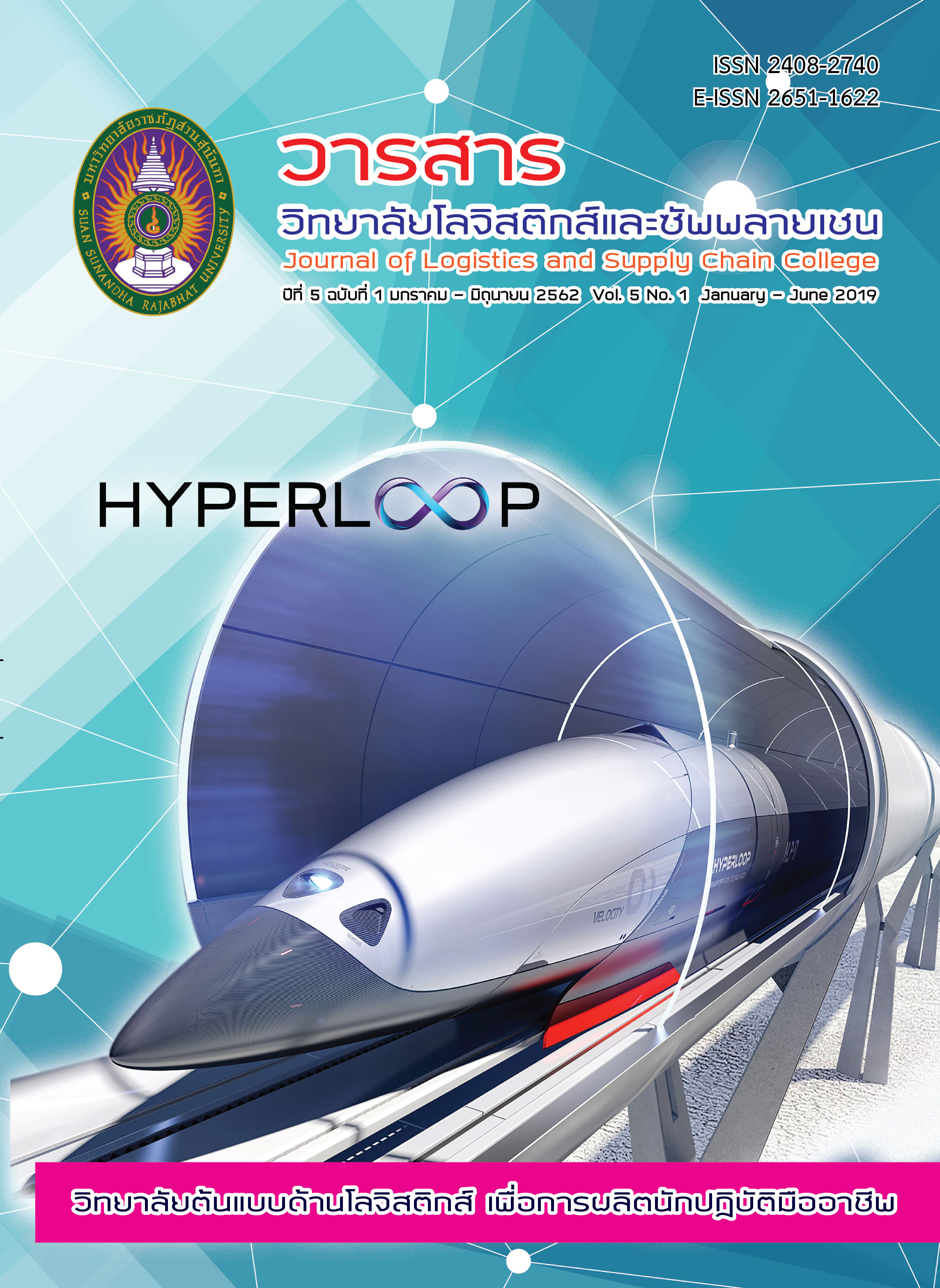The affecting of integrative logistics management influencing the marketing performance in high potential tourisms
Abstract
The objective of this mixed research were: 1) To study the factors affecting the marketing performance of tourism businesses in Thailand; 2) To provide the organizational marketing performance model. The instruments used were questionnaires and in-depth interviewing. The samples were 2,899 potential and registered firms who served only Middle East tourists. The samples of quantitative research were 352 firms with sample random sampling. Path analysis on data and quantitative research methods were used in purposive sampling on 5 firms. The finding concluded that integrative logistics affected significantly on marketing performance at the level of 0.007, trust affected significantly on marketing performance at the level of 0.026, personal interrelationship affected significantly on marketing performance at the level of 0.007, and validity measurement of marketing performance model was according to the assumptions.
References
กระทรวงการท่องเที่ยวและกีฬา. (2554). แผนพัฒนาการท่องเที่ยวแห่งชาติ พ.ศ. 2554 – 2559. ค้นจาก: https://www.tica.or.th/images/plan_tourism2555-2559/2555-2559.pdf.
การท่องเที่ยวแห่งประเทศไทย. (2551). วิเคราะห์ศักยภาพของอุตสาหกรรมการท่องเที่ยวของประเทศไทย กองวิชาการการท่องเที่ยวแห่งประเทศไทย. กรุงเทพฯ: ผู้แต่ง.
ชัยฤทธิ์ ทองรอด. (2561). การจัดการการท่องเที่ยวเชิงเกษตร ล่องเรือชมสวน เลียบคลองมหาสวัสดิ์อำเภอพุทธมณฑลจังหวัดนครปฐม. วารสารวิทยาลัยดุสิตธานี, 12(2), 115 -130
Anderson, P. F. (1982). Marketing, Strategic Planning and the Theory of Firm. Journal of Marketing, 46(4), 15-26.
Chien-Yu Tsao., & Chin-Cheng Ni. (2016). Vulnerability, resilience, and the adaptive cycle in a crisis-prone tourism community. Tourism Geographies 18(1), 80-105.
Dubihlela, J., & Omoru, O. (2014). Barriers to effective supply chain management implementation, and impact on business performance of SMEs in South Africa. Journal of applied business research, 30(4), 1019-1030.
Ellinger, A. E., Daugherty, P. J., & Keller, S. (2000). The relationship between marketing logistics interdepartmental integration and performance in U.S. manufacturing firms: An empirical study. Journal of Business Logistics, 21(1), 1-22
Kerdpitak, C., & Heuer, K. (2013) Influencing of marketing competency in aviation industry. International journal of business tourism and applied sciences, 1(1), 1-11
Kerdpitak C., & Heuer, K. (2016) Key success factors of tourist satisfaction in tourism services provider. Journal of Applied Business Research, 32(4), 1237-1242.
Kerdpitak, C., (2017) Factors leading to success of tourism business in Bangkok in Bangkok Thailand. Journal of Applied Business Research, 33(3), 1-9.
Klein, R. (2007). Customization and real time information access in integrated e-business supply chain relationships. Journal of operation management, 25(6), 1366-1381.
Lovett S, Simmons LC, & Kali R. (1999). Guanxi versus the market : ethics and efficiency. International Journal of Business Study, 30(2), 231-248
Panayides, P. M. (2007). The Impact of organizational learning on relationship orientation, logistics service effectiveness and performance. Journal of Industrial Marketing Management, 36(1), 68-80.
Pennington-Gray, L. (2014). Developing a Destination Disaster Impact Framework. Tourism Analysis, 19(1), 105-110.
Paulraj, A., & Chen, I. J. (2007). Strategic Buyer-Supplier Relationships, Information Technology and External Logistics Integration. The Journal of Supply Chain Management, 43(2), 2-14
Stank, T. P., Daugherty, P. J., & Ellinger, A. E. (1999). Marketing Logistics Integration and Firm Performanc. International Journal of Logistics Management, 10(1), 11-24.
Vargas, G., Cardenas, L. & Matarran, L. (2000). “Internal and External integratation of assembly manufacturing activites. International Journal of Operation and Production Management, 20(7), 809-822.
Xue, L., Ray, G. & Sambamurthy, V. (2013). The impact of supply chain electronic integration on customer service performance. Journal of operations management 82(9) 1-3
Yamane, T. (1973). Statistics: An Introductory (3rd ed). New York Harper and Row
Zacharia, Z. G., & Mentzer, J. T. (2004). Logistics salience in a changing environment. Journal of Business Logistics, 25(1), 187-210.



